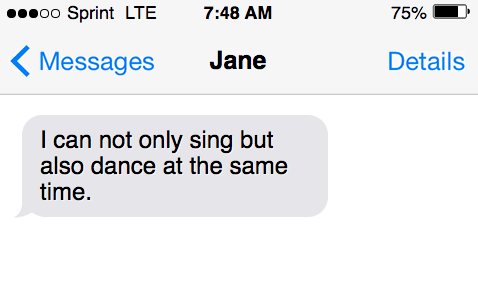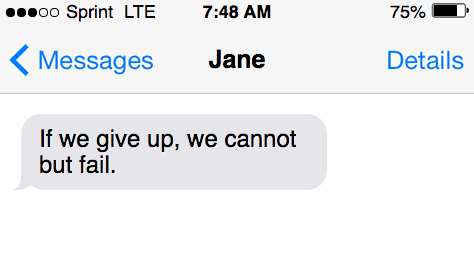Both native speakers and English learners stumble upon the confusion of using “cannot or can not.” It’s not the easiest homophone to remember. Contractions and compound words can get confusing to remember.
The good news is that of the three word variations (Cannot, Can Not, and Can’t) they mostly have the same meaning. But the phrase “can not” often appears in a sentence different than the others.
Let’s take a look at the difference between cannot or can not.
What Does ‘Cannot’ Mean?
The word ‘Cannot’ means the inability to do something. Cannot falls under the grammar section of helping verbs, appearing almost like a single word.
Cannot acts as the contraction of the phrase ‘Can Not.’
You can use both ‘Cannot or Can Not’ in American English since both forms are accepted and correct.
Types of Tenses ‘Cannot’ and ‘Can’t’ Use
There are three types of tenses to get familiar with in the English language. Those are Past, Present, and Future. But ‘Cannot’ and ‘Can’t’ get used in the present tense only. Typically, to indicate things that you can’t do.
You cannot use these words or contractions for past and future tense. For example, you have to use ‘Couldn’t’ instead of ‘Can’t’ for the past tense in a sentence.

When to Use ‘Can’t
Can’t is a contraction of ‘Cannot,’ and it’s suitable for informal writing or casual speaking. You might have noticed that ‘Cannot’ sounds rigid.
In comparison, ‘cannot’ is better suited in formal areas and writing styles (like MLA).
The use of ‘Can’t’ sounds more approachable and conversational. It’s better suited for informal writing.
Example in Sentences
- I can’t go back to that horrible place.
- Michael can’t seem to get a hold of it.
- You can’t use my soap because it’s personal.
- My teacher can’t seem to understand my debilitating study schedule.
- I can’t help but tell you how much I love you.
- You possibly can’t imagine having her back, do you?
- My parents can’t understand where I’m coming from.
When to Use ‘Cannot’
First, it’s important to recognize that this contraction is extremely popular in the English language. And it’s great that you’re deciding to learn the inner workings of these two words. It is pretty prevalent in both formal speech and writing.
Fun fact: Did you know that this auxiliary verb has been present since the 1500s?
The word ‘Cannot’ is perfectly suitable for areas like business, research studies, and academic reports.

Example in Sentences
- She cannot wait until Friday to collect her test report.
- I cannot imagine what it’s like to be in her place right now.
- If we give up, we cannot but fail.
- The government cannot fulfill the demands of the terrorists.
- Heather cannot wait until Monday to receive her blood test samples.
- These penguins cannot survive in this weather.
- I am here to inform you that you cannot be at the library at this hour.
- Our institution cannot afford to lose any more students now.
- The human ear cannot detect certain types of sound.
- As a result of continuous conflicts with her co-workers, Lori cannot accept the promotion.
When to Use ‘Can Not’
Have you heard correlative conjunctions like, ‘but also’ and ‘not only’? If so, think of these two words in the same way.
The phrase ‘Can Not’ is relatively uncommon if you compare it to the usage of words and contractions like ‘Can’t’ and ‘Cannot.’
Here are some instances of how this phrase blends in sentences:
- Martha can not only bake but also cook.
- They can not only purchase the resort, but they can resell it for a huge profit.
- My pet cat Meredith can not only play dead but also roll over.
- This experiment is something that even experts can not only understand but also prove.
- Rupert can not only bring up the story in his speech but also show it.
- I can not only sing but also dance at the same time.
Is It ‘Can Not’ or ‘Cannot’
Both ‘Can Not’ and ‘Cannot’ are perfectly acceptable and correct to use in sentences. However, we recommend you stick with the latter since it tends to be more common.
Also, ‘Cannot’ does blend better in formal writing scenarios. You can also choose to use ‘Can’t,’ but it’s best for informal settings (like emails or text messages).
Is ‘Cannot’ Formal Language
Yes! ‘Cannot’ is formal language. incorporate it into your formal writing projects, professional presentations, research studies, and academic reports.
It is imperative to know that contractions in formal writing are typically frowned upon. For example, using “cannot” is acceptable if writing an essay.
| Word | Writing style |
| Can not | Formal/Informal |
| Cannot | Formal |
| Can’t | Formal/Informal |
Lesson in Review
The ‘Cannot or Can Not’ comparison is quite the whirlwind. There is room for confusion, but once you realize that they have the same meanings (with only style differences), it becomes far easier to comprehend.
Here’s what you need to remember to differentiate the two:
- You have to spell ‘Cannot’ as a single word.
- It isn’t possible to shorten the word ‘Cannot’ into the ‘Can’t’ contraction.
- You should only use ‘Can Not’ when another phrase contains ‘Not.’
In this way, you will get a better grip on the differences between them. It will become simple and easy for you to go about things in the grammar world.
Sources
- Cannot or Can Not
- Can’t or Couldn’t: What’s the Difference?
- Cannot vs Can Not vs Can’t: Differences Explained
- Can Not vs Cannot
- CANNOT
- ‘Cannot’ vs ‘Can Not’: Is there a Difference?
- Cannot Vs Can Not Vs Can’t – What’s the Difference?
Inside this article
Fact checked:
Content is rigorously reviewed by a team of qualified and experienced fact checkers. Fact checkers review articles for factual accuracy, relevance, and timeliness. Learn more.
Core lessons
Glossary
- Abstract Noun
- Accusative Case
- Anecdote
- Antonym
- Active Sentence
- Adverb
- Adjective
- Allegory
- Alliteration
- Adjective Clause
- Adjective Phrase
- Ampersand
- Anastrophe
- Adverbial Clause
- Appositive Phrase
- Clause
- Compound Adjective
- Complex Sentence
- Compound Words
- Compound Predicate
- Common Noun
- Comparative Adjective
- Comparative and Superlative
- Compound Noun
- Compound Subject
- Compound Sentence
- Copular Verb
- Collective Noun
- Colloquialism
- Conciseness
- Consonance
- Conditional
- Concrete Noun
- Conjunction
- Conjugation
- Conditional Sentence
- Comma Splice
- Correlative Conjunction
- Coordinating Conjunction
- Coordinate Adjective
- Cumulative Adjective
- Dative Case
- Determiner
- Declarative Sentence
- Declarative Statement
- Direct Object Pronoun
- Direct Object
- Diction
- Diphthong
- Dangling Modifier
- Demonstrative Pronoun
- Demonstrative Adjective
- Direct Characterization
- Definite Article
- Doublespeak
- False Dilemma Fallacy
- Future Perfect Progressive
- Future Simple
- Future Perfect Continuous
- Future Perfect
- First Conditional
- Irregular Adjective
- Irregular Verb
- Imperative Sentence
- Indefinite Article
- Intransitive Verb
- Introductory Phrase
- Indefinite Pronoun
- Indirect Characterization
- Interrogative Sentence
- Intensive Pronoun
- Inanimate Object
- Indefinite Tense
- Infinitive Phrase
- Interjection
- Intensifier
- Infinitive
- Indicative Mood
- Participle
- Parallelism
- Prepositional Phrase
- Past Simple Tense
- Past Continuous Tense
- Past Perfect Tense
- Past Progressive Tense
- Present Simple Tense
- Present Perfect Tense
- Personal Pronoun
- Personification
- Persuasive Writing
- Parallel Structure
- Phrasal Verb
- Predicate Adjective
- Predicate Nominative
- Phonetic Language
- Plural Noun
- Punctuation
- Punctuation Marks
- Preposition
- Preposition of Place
- Parts of Speech
- Possessive Adjective
- Possessive Determiner
- Possessive Case
- Possessive Noun
- Proper Adjective
- Proper Noun
- Present Participle
- Prefix
- Predicate



